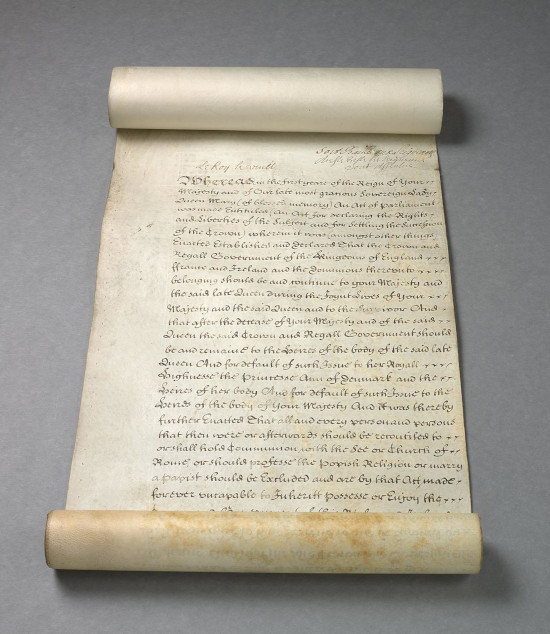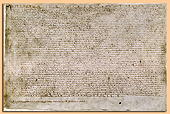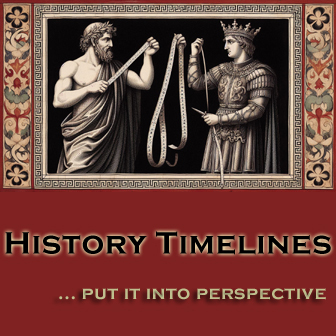|

The Act of Settlement - Photo courtesy of the British Parliamentary Archives
Act of Settlement 1701
The Act of Settlement is a document in British history, also known as:
"An Act for the further Limitation of the Crown, and better securing the Rights and Liberties of the Subject".
It was an add-on to the
 British Bill of Rights, 1689.
British Bill of Rights, 1689.
The Act
of Settlement of 1701 established the
Hanoverian succession to the British throne.
The Parliamentary Archives explain:
The main aim of this legislation was to ensure a Protestant succession
to the English throne.
In 1707, as a result of the Act of Union, this Act was extended to Scotland.
As a result of the Act of Settlement, George I, whose mother Sophia,
Electress of Hanover, would have succeeded Queen Anne had she not died only
a few weeks before her, inherited the throne, despite there being over
50 Catholic claimants.
Other clauses within the Act included a declaration that judges could only be removed by Parliament.
Meanwhile in Scotland
This from Bridget McPhail:
The death of Anne's last surviving heir in 1700 had opened up the vexed question of the succession.
The English Act of Settlement of 1701, which accepted the Hanoverian claim, had angered the Scots by its
arrogant assumption that Scotland would automatically follow England's lead in the matter, and the resumption
of war with France — a war into which Anne had entered Scotland without consulting her Scottish parliament —
further fuelled resentment.
B. McPhail. "Scotland's sovereignty asserted: the debate over the Anglo-Scottish Union of 1707."
Parergon, 11 (2013): 27 - 44. https://doi.org/10.1353/PGN.1993.0088.
What's the Current Monarch's Position?
The Royal Household at Buckingham Palace explains:
The Act of Settlement of 1701 was designed to secure the Protestant succession to the throne,
and to strengthen the guarantees for ensuring a parliamentary system of government.
The Act also strengthened the Bill of Rights (1689), which had previously established the order of succession for Mary II’s heirs.
Mary’s father, James II, had fled England in 1688 during events described as the ‘Glorious Revolution’.
James’s Roman Catholic sympathies and belief in the divine right of the Crown, resulted in disgruntled parliamentarians
offering the throne to his eldest Protestant daughter, Mary. She accepted it on condition that she could reign jointly
with her Dutch husband, William of Orange, who became William III.
From this time onwards the Bill of Rights proved to be of fundamental importance for the evolution of constitutional monarchy.
The Act of Settlement reinforced the Bill of Rights, in that it strengthened the principle that government was undertaken
by the Sovereign and his or her constitutional advisers (i.e. his or her Ministers), not by the Sovereign and any personal
advisers whom he or she happened to choose.
Although the Bill of Rights had established the order of succession with the heirs of Mary II, Anne and William III,
neither of James II’s daughters had surviving heirs, casting uncertainty on the future of succession.
Mary had died of smallpox in 1694, aged 32, and by 1700 William was dying. Anne's only surviving child (out of 17 children),
the Duke of Gloucester, died that same year at the age of 11. Without a confirmed heir the decision was made by Parliament
to ensure that the succession of future sovereigns remained within the Protestant faith.
According to the 1701 Act, succession to the throne went to Princess Sophia, Electress of Hanover (James I's granddaughter)
and her Protestant heirs. However, Sophia died before Queen Anne, therefore the succession passed to her son, George, Elector of Hanover,
who in 1714 became King George I.
The act was later extended to Scotland as a result of the Treaty of Union enacted in the Acts of Union of 1707.
The Act also laid down the conditions under which the Crown could be held. No Roman Catholic, nor anyone married to a Roman Catholic,
could hold the Crown. The Sovereign now had to swear to maintain the Church of England (and after 1707, the Church of Scotland).
The Act of Settlement not only addressed the dynastic and religious aspects of succession, it also further restricted the powers and
prerogatives of the Crown.
Under the Act, parliamentary consent had to be given for the Sovereign to engage in war or leave the country, and judges were to hold
office on good conduct and not at Royal pleasure - thus establishing judicial independence.
The Succession to the Crown Act (2013) amended the provisions of the Bill of Rights and the Act of Settlement to end the system of male
primogeniture, under which a younger son can displace an elder daughter in the line of succession. The Act applies to those born after 28 October 2011.
The Act also ended the provisions by which those who marry Roman Catholics are disqualified from the line of succession.
The changes came into force in all sixteen Realms in March 2015.
See also
 Governments of Britain
Governments of Britain
More History
|
| |
Frequently Viewed
Documents

Magna Carta 1215

British Bill of Rights
1689

U.S. Constitution 1787
Famous Speeches in History
Browse the speech archive:
 Speeches by Topic A-Z
Speeches by Topic A-Z
 Speeches by Speaker A-Z
Speeches by Speaker A-Z
 Speeches in Chronological
Order
Speeches in Chronological
Order
 Speeches Given by Women
Speeches Given by Women
 Speeches Given by African-Americans
Speeches Given by African-Americans
 Speeches Given by U.S. Presidents
Speeches Given by U.S. Presidents
From the Original Text of the Act of Settlement 1701
... and it is hereby enacted That all and every Person and Persons who shall or may take or
inherit the said Crown by vertue of the Limitation of this present Act and is are or shall be
reconciled to or shall hold Communion with the See or Church of Rome or shall profess the
Popish Religion or shall marry a Papist shall be subject to such Incapacities as in such Case
or Cases are by the said recited Act provided enacted and established...
... That whosoever shall hereafter come to the Possession of this Crown shall joyn in Communion
with the Church of England as by Law established
That in case the Crown and Imperiall Dignity of this Realm shall hereafter come to any Person
not being a Native of this Kingdom of England this Nation be not obliged to ingage in any Warr
for the Defence of any Dominions or Territories which do not belong to the Crown of England without
the Consent of Parliament
That no Person who shall hereafter come to the Possession of this Crown shall go out of the
Dominions of England Scotland or Ireland without Consent of Parliament.
That from and after the Time that the further Limitation by this Act shall take Effect all Matters
and Things relating to the well governing of this Kingdom which are properly cognizable in the Privy
Councill by the Laws and Customs of this Realme shall be transacted there and all Resolutions taken
thereupon shall be signed by such of the Privy Councill as shall advise and consent to the same. ...

|
|